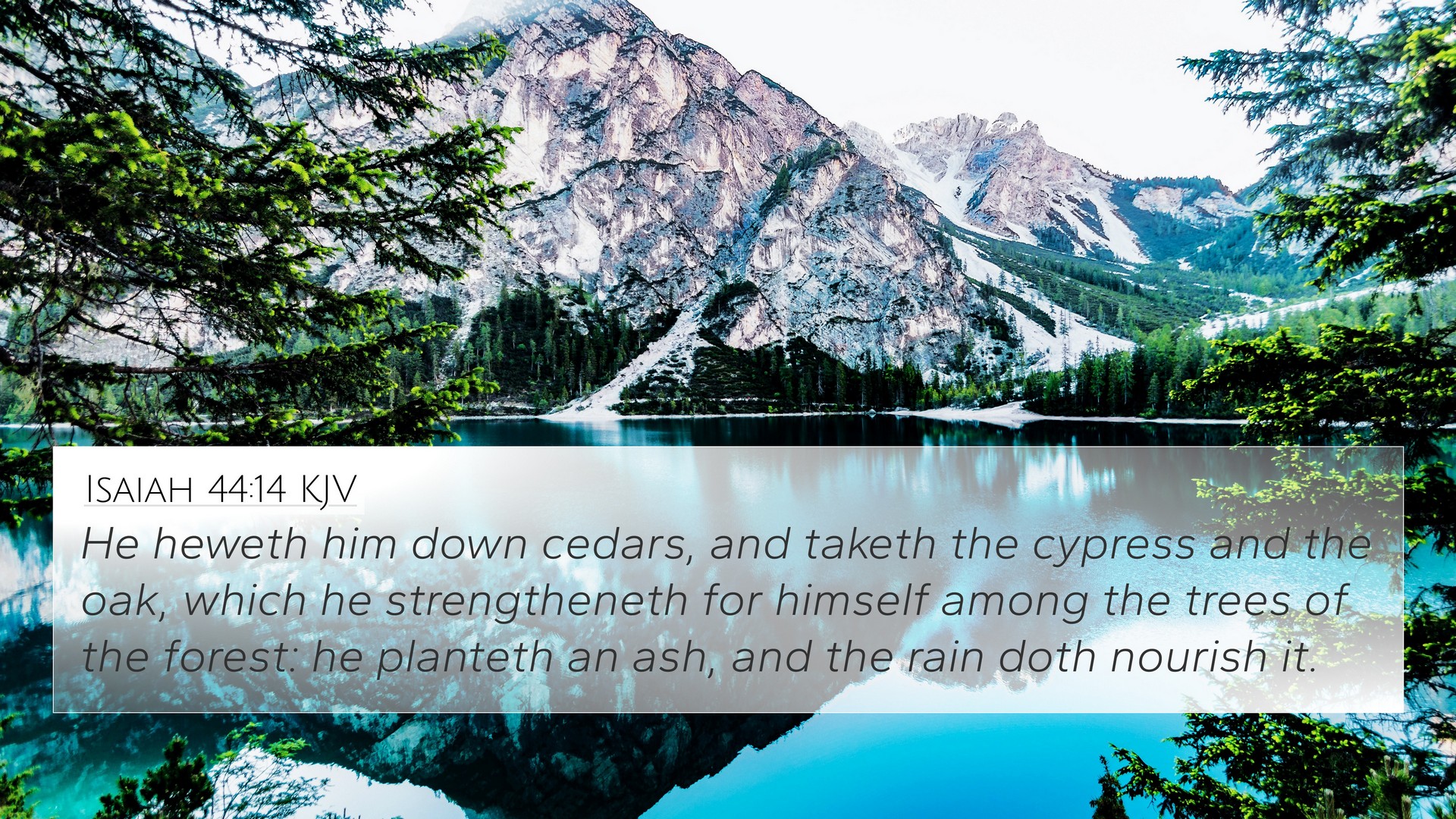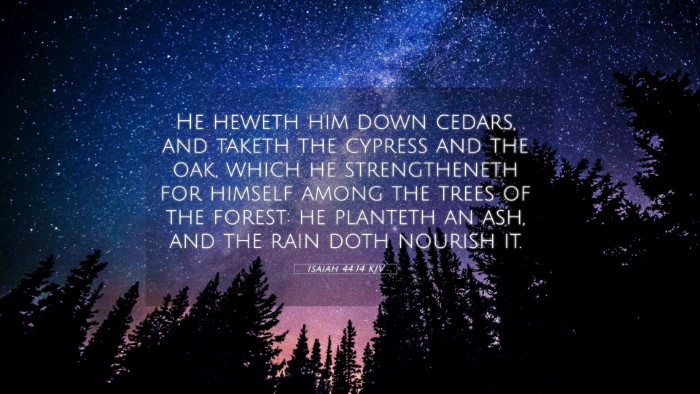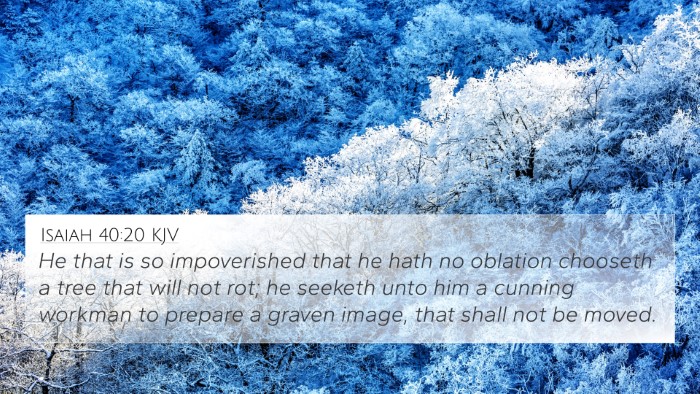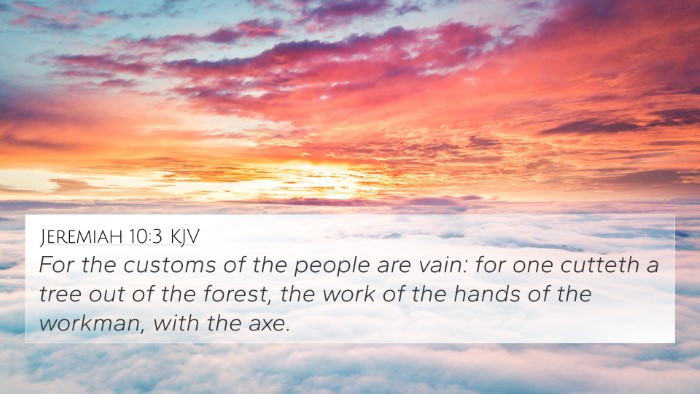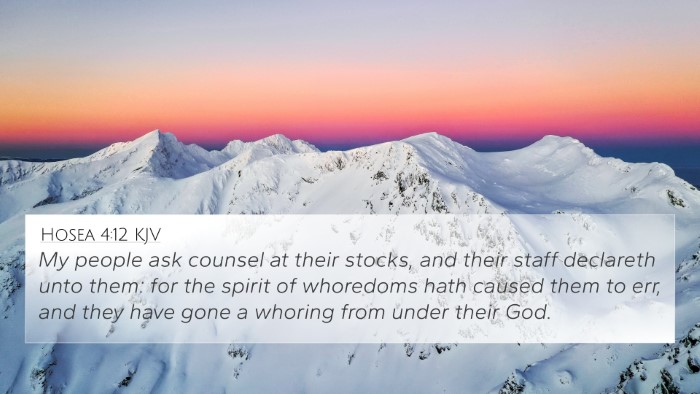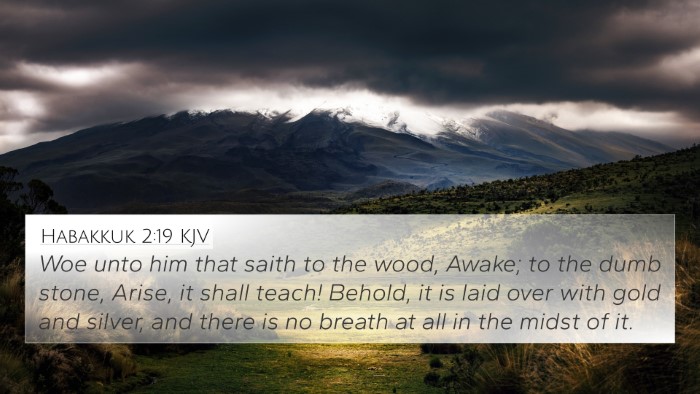Understanding Isaiah 44:14
Isaiah 44:14 states: "He hews down cedars, and taketh the cypress and the oak, which he strengtheneth for himself among the trees of the forest: he planteth an ash, and the rain doth nourish it."
This verse depicts the foolishness of idolatry, using the example of a man who cuts down trees to create objects of worship from materials created by God himself. Various public domain commentaries illuminate the meaning behind this verse, revealing its themes and connections to other Biblical texts.
Analysis from Commentaries
- Matthew Henry:
Henry emphasizes the absurdity of worshipping creations rather than the Creator. He outlines how individuals take natural resources—cedars, oaks, and ashes, which are all gifts from God—and craft them into idols. This act of worshipping lifeless objects reflects a profound misunderstanding of God’s sovereignty.
- Albert Barnes:
Barnes notes that this verse highlights the futility of idolatry. He indicates that the craftsman relies on the same material that God created, failing to recognize the divine Creator's power. This disconnect showcases the limitations of human understanding and the folly of placing value in transient, earthly things.
- Adam Clarke:
Clarke remarks on the contrasts present in this verse, particularly between the natural world and human-made idols. He presents the idea that the act of idol-making not only divides one's loyalty from God but also demonstrates an inherent lack of wisdom and insight into the nature of God’s creation.
Key Themes and Insights
Isaiah 44:14 encourages readers to reflect on the futility of idolatry and the importance of recognizing God as the ultimate creator. The actions of the craftsman symbolize a deeper spiritual truth about the dangers of misplaced worship and idolatry, which is consistent across various texts in Scripture.
Cross-References to Isaiah 44:14
-
Isaiah 40:19-20: "The woodworker measures with a line and makes an outline with a marker; he ruts it out with chisels and marks it with compasses. He shapes it into a human form, human likeness, and gives it a place in a shrine."
-
Jeremiah 10:3-5: "For the customs of the people are worthless; they cut a tree out of the forest, and a craftsman shapes it with his chisel. They adorn it with silver and gold; they fasten it with hammer and nails so it will not totter."
-
Psalm 115:4-7: "But their idols are silver and gold, made by human hands. They have mouths, but cannot speak; eyes, but cannot see; they have ears, but cannot hear; noses, but cannot smell."
-
Isaiah 45:20: "Gather together and come; assemble, you fugitives from the nations. Ignorant are those who carry about idols of wood, who pray to gods that cannot save."
-
Romans 1:22-23: "Although they claimed to be wise, they became fools and exchanged the glory of the immortal God for images made to look like a mortal human being and birds and animals and reptiles."
-
1 Corinthians 8:4-6: "So then, about eating food sacrificed to idols: we know that an idol is nothing at all in the world and that there is no God but one."
-
Acts 17:29: "Therefore since we are God's offspring, we should not think that the divine being is like gold or silver or stone—an image made by human design and skill."
Thematic Connections
The verse from Isaiah connects with various themes within the Scriptures, particularly focusing on:
- Idolatry and its consequences
- The nature of true worship
- The folly of placing our trust in created things over the Creator
- God’s sovereignty over all creation
Tools for Bible Cross-Referencing
Engaging with cross-references can deepen understanding of Bible verses, particularly through:
-
Bible Concordance: A tool to find original Hebrew or Greek words and their occurrences.
-
Bible Cross-Reference Guide: A collection of verses linked thematically or contextually.
-
Cross-Reference Bible Study: Methodologies focusing on thematic study across verses.
Conclusion
Isaiah 44:14 serves as a poignant reminder of God's creative power and the folly of idolatry. Through careful study and cross-referencing with other Biblical texts, believers can gain a comprehensive understanding of the dangers associated with placing faith in false idols. This exploration not only reinforces the importance of true worship but also highlights the enduring relevance of Isaiah’s message throughout the Scriptures.
